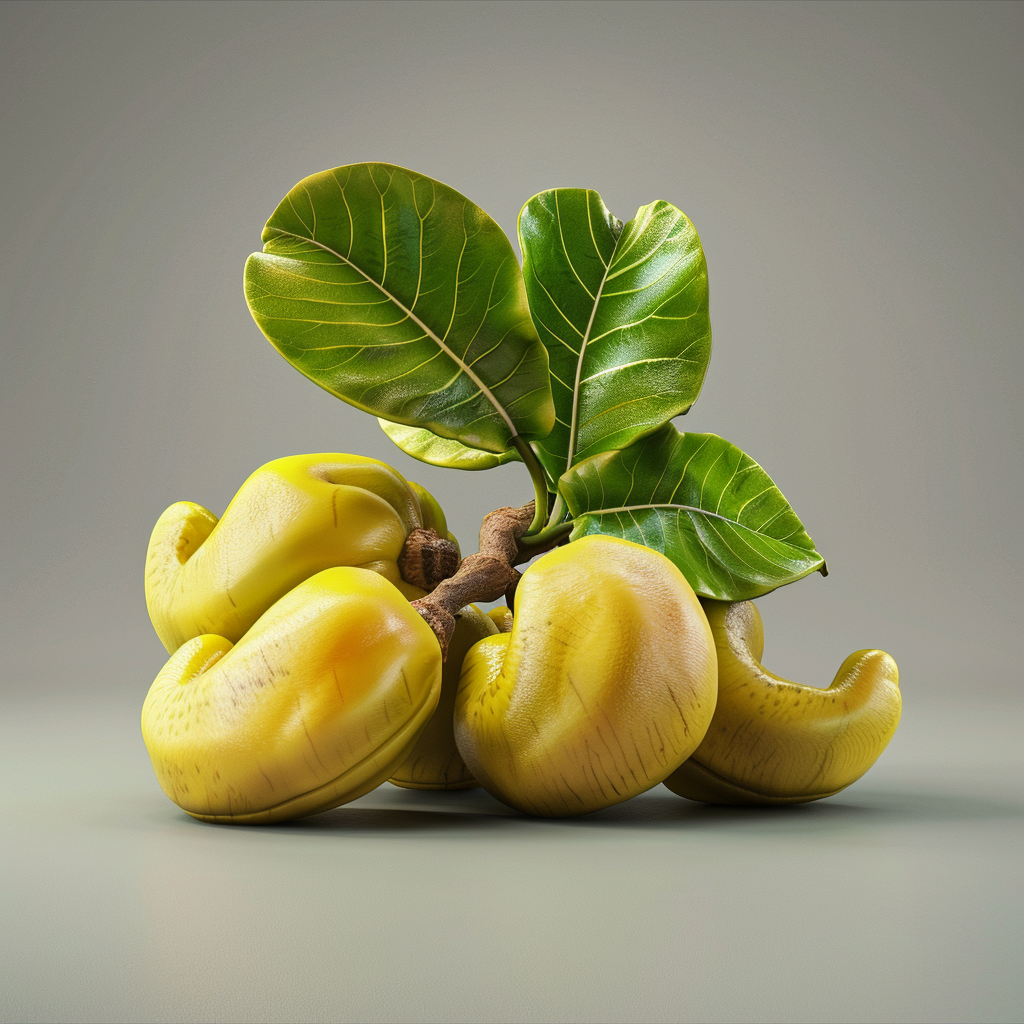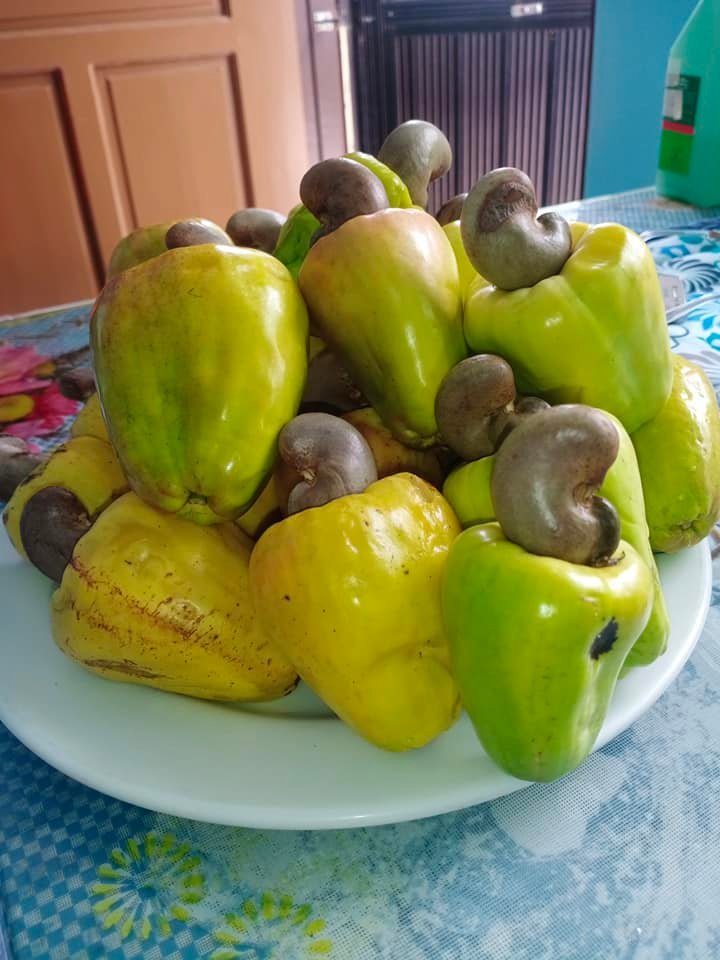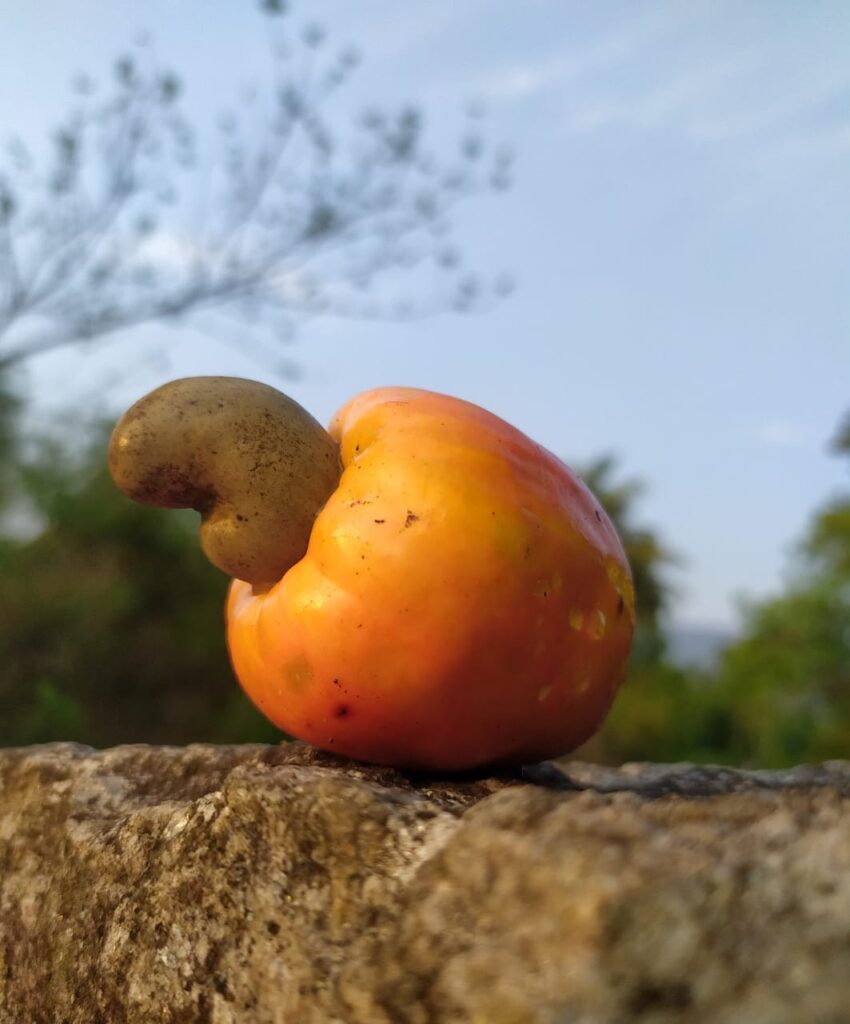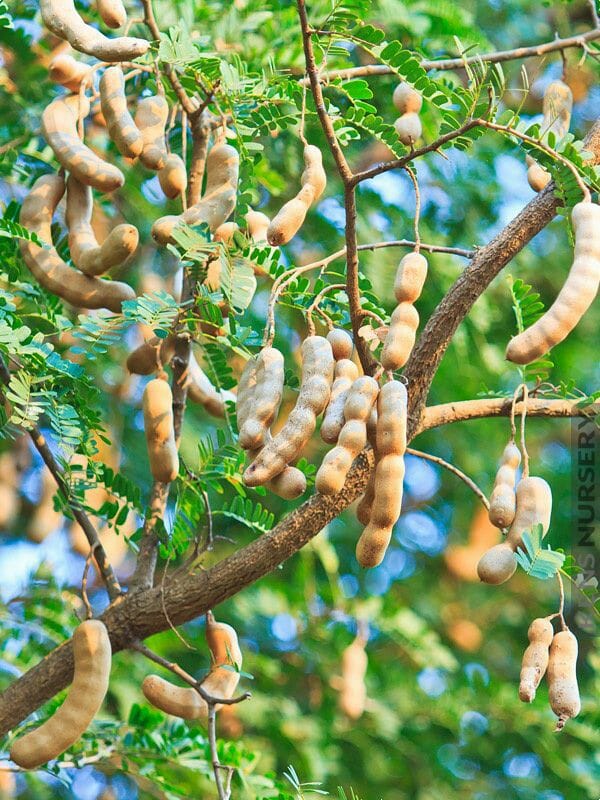Growing up in Jamaica, you are no stranger to nature's bounty and blessings. Trees galore that offer the most tastiest fruits that only enhance the Jamaican experience. When one thinks Jamaica, delicious produce come to mind but many of these delectable natural treats are not native to Jamaica. Let's explore 5 trees/fruits that are embedded in the Jamaica experience that may not native to the country.
- Cashew

Native to the coastal regions of northeastern Brazil, the cashew tree boasts a unique distinction—it produces both a delectable fruit and a coveted nut. Belonging to the family of Anacardiaceae, which also includes mangoes and pistachios, it is said the cashew tree found its way to the Caribbean shores through the intricate trade routes established during the colonial era.

Roots of the Cashew Tree in Jamaica
It is said Portuguese traders, renowned for their expansive trade networks in the 16th century, played a pivotal role in introducing the cashew tree to the West Indies. Through their voyages across continents, they brought with them the seeds of this remarkable tree, which found fertile ground in Jamaica's tropical climate. Despite its origins in Brazil, the cashew tree seamlessly integrated into the island's agricultural landscape, alongside other imported crops like sugar cane and coffee.

Nutritional Value and Culinary Delights
In Jamaica, cashews are prized not only for their culinary versatility but also for their nutritional value. The crescent-shaped nut, with its rich flavor profile and high oil content, has become a beloved staple in Jamaican cuisine. Whether roasted and enjoyed as a savory snack or incorporated into complex dishes, cashews offer a satisfying crunch and a burst of flavor.
Beyond their culinary appeal, cashews are packed with essential nutrients, including proteins, copper, calcium, magnesium, iron, phosphorus, potassium, and zinc. They also contain vitamins such as vitamin C, vitamin B, thiamin, folate, vitamin E, and vitamin K. Additionally, cashews are a source of oleic acid, providing a good quantity of monounsaturated fat and low amounts of polyunsaturated fats with no cholesterol content when consumed in moderation.

Health Benefits and Medicinal Uses
While cashews are undeniably delicious, they also boast an array of health benefits. From boosting heart health and promoting strong nerve and muscle function to improving bone and oral health, cashews are a powerhouse of nutrients. They also offer antioxidant defense, strengthen the immune system, and stave off the effects of diabetes, anemia, and gallstones.

In addition to their culinary and nutritional value, every part of the cashew tree appears to have medicinal uses. Jamaican herbalists utilize leaf extracts for bathing ulcers or fever baths, while infusions of leaves and bark are used for dysentery, toothache, and sore gums. Furthermore, extracts from the cashew apple and bark have been reported to act against bacteria that cause stomach ulcers.

Enjoying Cashews in Jamaica
In Jamaica, cashews are not only enjoyed for their culinary delights but also cherished for their cultural significance. From snacking on roasted cashews to sipping on refreshing cashew fruit juice, Jamaicans embrace the diverse offerings of this versatile tree. Whether incorporated into traditional dishes, juice or enjoyed as a standalone treat, cashews have become an integral part of the island's gastronomic tapestry. You'll find in the supermarket loads of nut mixes that Jamaicans enjoy.

As visitors traverse the verdant landscapes of Jamaica, they are invited to partake in the bounty of the cashew tree, savoring its delicious fruits and nuts while basking in the warm embrace of tropical paradise. So, indulge in the savory crunch of roasted cashews or quench your thirst with a glass of tangy cashew fruit juice—there's no shortage of ways to experience the tropical bounty of Jamaica's cashew tree.
2. Jackfruit

While not native to Jamaica, this exotic fruit found its way to the island's shores in the late 18th century, tracing its origins back to the lush orchards of South Asia. Introduced from India in the 1780s, the jackfruit captivated Jamaicans with its colossal size and tantalizing flavors.
A Taste of Tropical Splendor
The Jamaican jackfruit, renowned as the largest fruit to bear on trees worldwide, made its debut on the island's culinary scene with a flourish. Originally hailing from South Asia, the jackfruit dazzles with its spiky exterior and vibrant green or yellow hues. Weighing up to a staggering 80 pounds, this behemoth of a fruit boasts a flavor profile reminiscent of a symphony of fruits—apples, pineapples, mangoes, and bananas dance harmoniously on the palate with each luscious bite.

Versatility in Every Bite
What sets the jackfruit apart is its remarkable versatility. Whether enjoyed raw or cooked, the jackfruit offers a culinary adventure like no other. The flesh, or fruit pods, steal the spotlight, captivating taste buds with their delectable sweetness. From indulgent desserts to savory curries, the jackfruit lends its unique flavor to an array of dishes, adding a tropical twist to every meal.
A Nutritional Powerhouse
Beyond its irresistible taste, the jackfruit packs a nutritional punch. Rich in essential nutrients like vitamin B6, vitamin C, and potassium, this tropical delight offers a healthy indulgence for the body and soul. With its high fiber content and low calorie count, the jackfruit is a guilt-free treat that nourishes and satisfies.

From Tree to Table: A Journey of Cultivation
In the verdant landscapes of Jamaica, the jackfruit finds its perfect home, thriving in the island's tropical climate. Cultivated with care, the jackfruit tree graces orchards with its towering presence, bearing fruits of unparalleled size and flavor. With minimal pruning and careful attention, Jamaican farmers ensure a bountiful harvest, bringing the bounty of the jackfruit from tree to table.
Cultural Significance and Culinary Traditions
In Jamaica, the jackfruit holds a special place in the hearts of locals, woven into the fabric of culinary traditions and cultural celebrations. From festive gatherings to everyday meals, the jackfruit adds a touch of tropical splendor to every occasion. Whether enjoyed fresh or incorporated into traditional dishes, the jackfruit symbolizes the vibrant spirit of Jamaica and the rich tapestry of its culinary heritage.

Preserving the Legacy of the Jackfruit
As Jamaica continues to embrace the legacy of the jackfruit, efforts are underway to preserve this tropical treasure for future generations. From sustainable farming practices to innovative culinary creations, Jamaicans are dedicated to safeguarding the jackfruit's place in their cultural heritage. With each bite of this exquisite fruit, Jamaicans pay homage to the centuries-old tradition of cultivating and savoring the bounty of the land.

Embrace the Essence of Jamaica: Indulge in the Jackfruit Experience
As you journey through the enchanting landscapes of Jamaica, immerse yourself in the allure of the jackfruit. From its humble origins in South Asia to its majestic presence in Jamaican orchards, the jackfruit embodies the essence of tropical splendor. So, savor the sweetness, relish the flavor, and celebrate the rich tapestry of Jamaica's culinary heritage with every delicious bite of the magnificent jackfruit.
3. Otaheiti Apple

Introduction to Jamaica: The Otaheiti Apple, also known as the Malay rose apple or mountain apple, found its way to Jamaica through Captain Bligh, an English officer in the Royal Navy, who introduced it from Tahiti in 1793. While its origins trace back to Malaysia, it quickly adapted to the tropical climate of Jamaica and became a treasured fruit on the island.

Enjoyment in Jamaica: Jamaicans have embraced the Otaheiti Apple as a beloved fruit, relishing its mildly sweet flavor and refreshing qualities. It's commonly eaten raw, freshly picked from the tree, and is a staple in Jamaican cuisine. The fruit's skin bruises easily and ranges in color from red to crimson to burgundy, with the darkest fruits often being the sweetest. Some Jamaicans also use the Otaheiti Apple to make jams or juices, which are enjoyed for their delightful taste and nutritional benefits.

Health Benefits: Beyond its delicious taste, the Otaheiti Apple offers numerous health benefits to Jamaicans. Rich in vitamins A and C, as well as iron and high in fiber, the fruit promotes overall health and well-being. Its antioxidant properties help combat free radicals and mitigate the risk of various diseases, including certain cancers. Additionally, the Otaheiti Apple's low sugar content makes it an excellent option for individuals managing diabetes, providing a natural and nutritious alternative.

Cultural Significance: The Otaheiti Apple has become deeply ingrained in Jamaican culture and cuisine, symbolizing the island's rich agricultural heritage and biodiversity. It is often celebrated in local festivals and events, where Jamaicans gather to enjoy its delicious flavor and share stories of its history and significance. The fruit's versatility in culinary creations, from jams to pies to refreshing juices, reflects Jamaica's vibrant culinary traditions and creativity.
The fruit's popularity among Jamaicans has led to the establishment of orchards across the island, ensuring its continued availability and enjoyment for generations to come.

With its tantalizing flavor, abundance of nutrients, and versatility in culinary applications, this fruit offers a true taste of tropical paradise.
Whether enjoyed freshly picked from the tree, blended into a refreshing juice, or crafted into delectable jams and pies, the Otaheiti Apple promises a delightful culinary experience that nourishes both body and soul. So why not savor a slice of Jamaica's heritage with every bite? Embrace the Otaheiti Apple and indulge in its vibrant flavor and myriad health benefits—it's a taste of Jamaica you won't want to miss!
4. Mango

Mangoes, originating in South Asia over 6,000 years ago, found their way to Jamaica through a fascinating tale of maritime discovery. In the 1700s, varieties of this delectable fruit were stumbled upon aboard a French vessel destined for Hispaniola. Captured at sea by Lord Rodney, these mangoes made their way to the shores of Jamaica, forever embedding themselves in the island's culinary tapestry.

Indulging in Jamaican Mango Delights
In Jamaica, mangoes are more than just a fruit—they're a cherished tradition, enjoyed in myriad ways that showcase their irresistible flavor and versatility. Whether you're biting into a ripe mango straight from the tree, relishing its juicy sweetness, or incorporating its vibrant flesh into mouthwatering dishes and desserts, the mango offers a taste of pure tropical bliss.

Varieties Galore: Exploring the Mango Rainbow
Jamaica boasts a rich tapestry of mango varieties, each with its own unique flavor profile and characteristics. From the succulent East Indian mangoes introduced in the late 19th century to the prized Haden and Number Eleven varieties, the island's mango orchards offer a diverse array of choices to tantalize the taste buds.
The Nutritional Bounty of Mangoes
Beyond their irresistible taste, mangoes pack a nutritional punch that makes them a true superfood. Rich in vitamins, minerals, and fiber, these tropical delights offer a host of health benefits that contribute to overall well-being.

Gut Health and Weight Management
Mangoes are a good source of both soluble and insoluble fiber, supporting digestive health and promoting healthy weight management. Their high fiber content aids in regulating bowel movements and controlling hunger, making them a satisfying choice for those watching their waistlines.
Hair and Skin Vitality
Loaded with vitamins A, C, and E, mangoes contribute to healthy hair and skin by combating environmental damage and promoting cellular health. Incorporating mangoes into your diet provides a natural boost of these essential nutrients, helping you glow from the inside out.
Cholesterol and Blood Pressure Management
The soluble fiber in mangoes helps lower cholesterol levels, while their potassium content supports healthy blood pressure regulation. By incorporating mangoes into your daily diet, you can take proactive steps towards cardiovascular health and overall well-being.
Embracing the Mango Lifestyle
In conclusion, mangoes are more than just a fruit—they're a way of life in Jamaica. Whether enjoyed fresh, blended into smoothies, or infused into savory dishes, mangoes represent the vibrant essence of the island's culinary heritage. So, the next time you bite into a ripe, juicy mango, savor not just its delicious flavor, but also the rich history and nourishing goodness it brings to your plate.

5. Tamarind

Tamarind, with its origins in Africa, embarked on a historic journey that brought it to the shores of Jamaica and the wider Caribbean. Introduced in the 16th century by Portuguese and Spanish colonists, this versatile fruit found a new home in the Caribbean landscape. From its humble beginnings, tamarind trees now dot the Jamaican countryside, offering their sweet yet tangy pods to locals and visitors alike.

Savoring Tamarind: A Caribbean Culinary Delight
In Jamaica, tamarind isn't just a fruit—it's a cultural icon woven into the fabric of everyday life. From roadside trees to homemade delicacies, tamarind holds a special place in Jamaican cuisine and tradition.
Versatility in Flavor: From Candy to Curry
Tamarind's unique flavor profile lends itself to a myriad of culinary creations. Whether enjoyed as a chewy candy, a tangy sauce, or a key ingredient in savory dishes like curry and chutney, tamarind adds a delightful twist to Jamaican fare. Its sweet and sour notes tantalize the taste buds, making every bite a culinary adventure.

Tamarind's Medicinal Marvels
Beyond its culinary appeal, tamarind boasts a long history of medicinal use, offering a host of health benefits to those who indulge. Rich in essential nutrients and natural compounds, tamarind has been used to address a range of health concerns across cultures and centuries.
Nutritional Bounty: A Natural Source of Vitality
Tamarind packs a nutritional punch, offering a wealth of vitamins, minerals, and antioxidants to support overall health and well-being. From magnesium and potassium to vitamins B and C, tamarind provides a nourishing boost that fuels the body and mind.
Therapeutic Potential: Fighting Microbes and More

Studies suggest that tamarind may possess antimicrobial properties, making it a valuable ally in the fight against bacteria, viruses, and fungi. Additionally, tamarind's high magnesium content and anti-inflammatory effects contribute to its potential role in promoting heart health and reducing oxidative stress.
Embracing Tamarind's Legacy
As an integral part of Caribbean culture and cuisine, tamarind serves as a testament to the enduring connection between nature and nourishment. From its ancient roots in Africa to its modern-day presence in Jamaican kitchens, tamarind embodies the rich tapestry of flavors and traditions that define the Caribbean experience. Jamaicans especially love it as a sugary ball, eating it as it is or as a juice.

A Taste of Tradition: Tamarind's Role in Caribbean Life
Whether enjoyed as a refreshing beverage on a hot summer day or incorporated into traditional dishes during festive celebrations, tamarind remains a beloved staple of Caribbean living. Its versatility, flavor, and medicinal properties make it a true treasure of tropical abundance.
Unlocking the Benefits of Tamarind
In conclusion, tamarind isn't just a fruit—it's a symbol of resilience, flavor, and vitality. From its humble beginnings to its widespread popularity today, tamarind continues to captivate hearts and palates around the world. So, the next time you bite into a tangy tamarind treat, savor not just its delicious taste, but also the rich history and nourishing goodness it brings to your plate.
